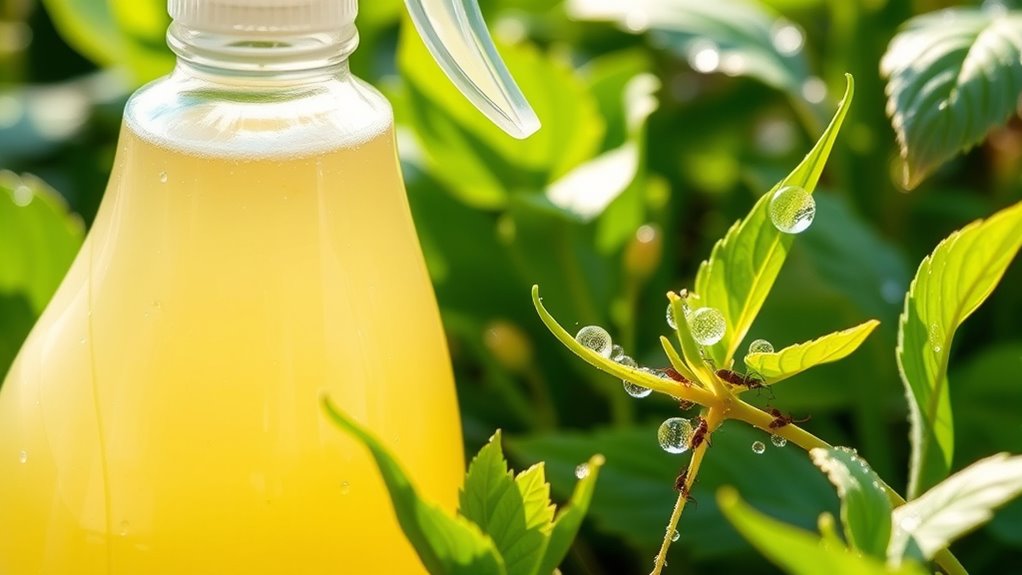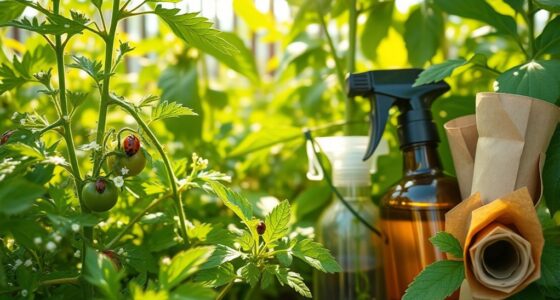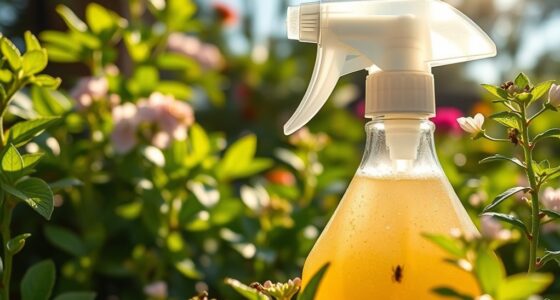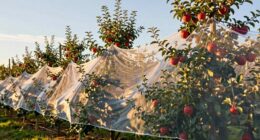To make a DIY natural insecticide, mix 1-2 tablespoons of gentle liquid soap like castile with a gallon of water. Test the solution on a small plant area first to avoid damage, then spray affected leaves, especially undersides, to control pests like aphids and mites. Regular applications help keep pests at bay while being safe for beneficial insects. Keep exploring to discover tips on using soap sprays effectively in your garden.
Key Takeaways
- Mix 1-2 tablespoons of biodegradable soap with a gallon of water to create an effective DIY insecticidal spray.
- Test on a small plant area before widespread application to prevent leaf damage.
- Spray on affected plants, focusing on undersides of leaves and pest hotspots for best results.
- Apply during early morning or late evening to avoid harming beneficial pollinators.
- Use regularly as part of an integrated pest management plan for natural, chemical-free pest control.

Soap sprays are a versatile and effective tool for maintaining a clean and healthy environment around your home or garden. When it comes to pest control strategies, many gardeners turn to homemade solutions that are safe, affordable, and eco-friendly. Soap sprays fit perfectly into this approach, especially if you’re committed to organic gardening techniques. They provide a natural alternative to chemical pesticides, helping you manage pests without harming beneficial insects or the broader ecosystem.
Soap sprays offer a safe, eco-friendly, and affordable solution for organic pest control in your garden.
To create a soap spray, you typically mix a gentle liquid soap—like pure castile soap or a biodegradable dish soap—with water. A common recipe involves about one to two tablespoons of soap per gallon of water. You should always test your solution on a small area of your plants first, as some soaps can cause leaf damage if they’re too concentrated or if your plants are particularly sensitive. Once you confirm there’s no adverse reaction, you can confidently spray your entire garden, focusing on the undersides of leaves and affected areas. Regular application can keep pests like aphids, mealybugs, and spider mites at bay, making soap sprays a practical component of your pest control strategies.
One of the key benefits of using soap sprays is that they align with organic gardening techniques, which emphasize natural methods over synthetic chemicals. Unlike many commercial pesticides, soap sprays break down quickly and don’t leave harmful residues. This means you can apply them more frequently if needed without risking soil or water contamination. Additionally, soap sprays work by suffocating soft-bodied insects and disrupting their cell membranes, leading to their death. They don’t discriminate between pests and beneficial insects, so it’s best to apply them directly to affected areas and avoid spraying during peak pollinator activity.
Another advantage is that soap sprays are simple to prepare and cost-effective. You probably already have the ingredients at home, making it easy to incorporate into your routine. They’re also safe for most plants, provided you follow the proper dilution and application guidelines. Over time, integrating soap sprays into your gardening practices enhances your ability to manage pests naturally, reducing dependency on chemical solutions. This not only supports a healthier garden but also promotes a more sustainable environment around your home.
Frequently Asked Questions
Can Soap Sprays Harm Beneficial Insects Like Bees?
You might wonder if soap spray impacts beneficial insects like bees. Generally, soap sprays are safe when used properly, but over-application or spraying during bloom can harm beneficial insect safety. To minimize impact, apply soap sprays early in the morning or late in the evening when bees are less active. Always follow instructions carefully to guarantee your soap spray benefits your garden without negatively affecting helpful pollinators.
How Often Should I Reapply Soap Sprays for Effective Pest Control?
Think of your soap spray as a gentle rain for your plants—too frequent, and it might cause harm; too infrequent, pests thrive. For effective pest control, you should reapply every 7-10 days, adjusting based on weather conditions like rain or heat. If rain washes away the spray, reapply sooner. Monitoring pests and weather helps you find the perfect balance, ensuring your garden stays healthy and pest-free.
Are Homemade Soap Sprays Safe for Edible Plants?
You’re asking if homemade soap sprays are safe for edible plants, which is a great concern. Generally, soap spray residues are safe when used properly, but it’s crucial to avoid excessive application. You should rinse your plants thoroughly before harvest to reduce any residues. Always choose mild, plant-safe soaps and apply during the cooler parts of the day to protect your edible plants’ safety and health.
What Are Common Mistakes to Avoid When Making Soap Sprays?
Imagine you’re in the middle of a garden quest, avoiding mistakes like incorrect mixing and overuse of soap. When making soap sprays, you should measure ingredients carefully and follow instructions. Using too much soap can harm plants, while incorrect mixing might reduce effectiveness. Always test on a small area first, and don’t spray during the hottest part of the day. These tips help make certain your DIY insecticide is both safe and effective.
Do Soap Sprays Work on All Types of Garden Pests?
You might wonder if soap sprays work on all garden pests, but their effectiveness depends on pest specificity and soap formulation. Some pests, like aphids, are easily controlled, while others, such as beetles, may resist. Using a properly formulated soap that’s gentle yet potent is key. Keep in mind that soap sprays are best suited for soft-bodied insects and may not eliminate all pest types effectively.
Conclusion
Now that you’ve learned how soap sprays gently whisper to pests, you can nurture your garden’s delicate balance. Think of these natural allies as a soft breeze guiding unwanted guests away without disturbing the vibrant harmony of your blooms. With a little care and patience, your garden will flourish like a peaceful meadow, free from harsh chemicals. Embrace this tender approach, and watch your plants thrive in a gentle, nurturing embrace.









